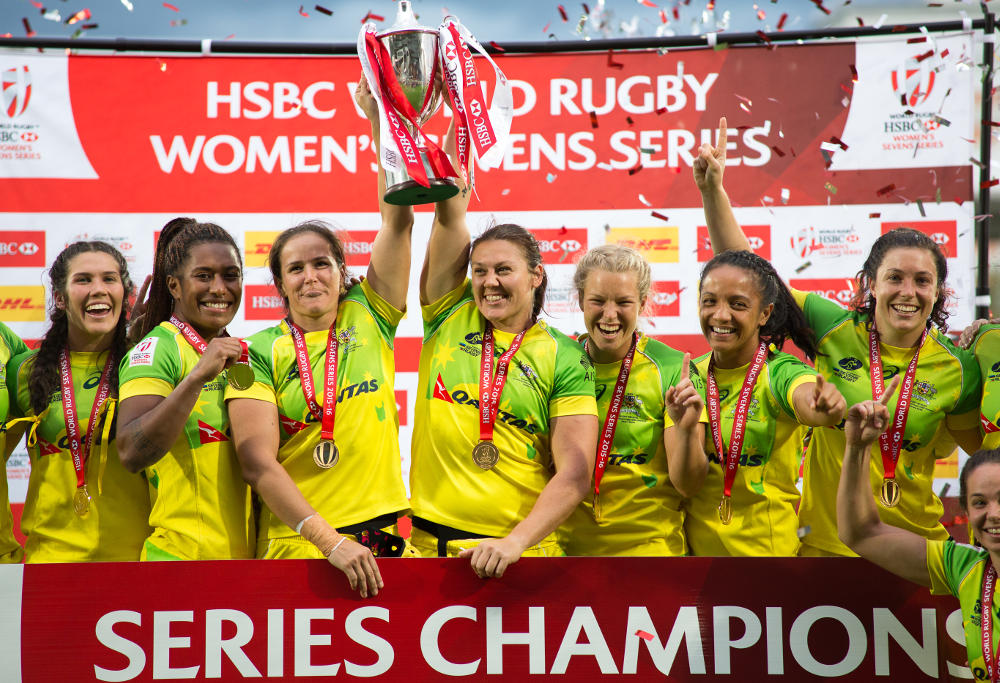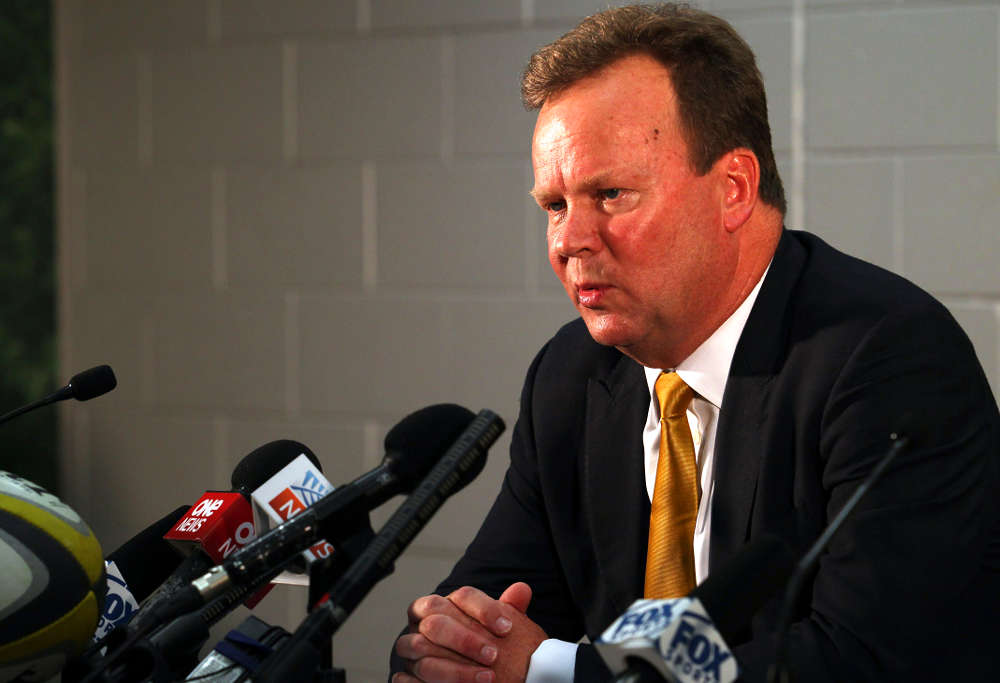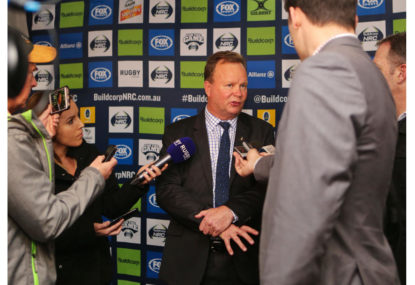The Australian women’s sevens stars (gold medal winners at the Rio Olympics), an LGBT advocate for greater diversity in rugby (Andrew Purchas), a former Wallabies captain (Phil Kearns) and a stalwart of rugby in South Australia (William Holdich) were all named in the 2017 Australia Day Honours list.
But only the Women’s Sevens and the LGBT advocate were named in an ARU media release noting the 2017 Honours list.
Why the ARU should take this restricted course of acknowledgement is curious and hard to understand.
In my view it is a significant sign of disrespect that the ARU refused to acknowledge, in particular, the AM medal awarded to Phil Kearns in the 2017 Australia Day Honours list.
There was another curious aspect about the ARU media release which was headed: “Sevens Stars and LGBT Rugby Advocate Grace Australia Day Honours List.” That aspect involves the timing of the release.
The media release was sent out at 4.44 am on 26 January, Australia Day. The very early hour of the media release suggests the ARU wanted its headline to be picked up by the electronic media in their reports on the Honours list in their Australia Day bulletins.
The inference I draw from this early publication of the media release and its heading is that the ARU was really, really, really determined to make some significant point about its agenda going into the 2017 rugby season, a season charged with a host of major problems for the ARU specifically and rugby in Australia in general.
And this agenda, it seems to me, is the ARU’s determination to push a focus on a small part within the wider Australian rugby community.
The media release quoted ARU CEO Pulver on the Australian women’s sevens team: “It would be difficult to find a team that is so devoted to making a difference within the community. The team earnestly wants to create a new generation of female rugby players, and all their efforts in training and community work are targeted towards this goal.”
This is true. The Australian women’s sevens team, the Pearls, deserve every honour rugby and the wider community can bestow on them.

They are an iconic Australian sporting team with their capture of the first Olympic gold medal for Women’s sevens rugby ever contested.
The Sydney Morning Herald, in their detailed coverage of the Honours list, ran a short colour article on Charlotte Caslick (OAM), one of the 12 members of the Pearls to receive a Medal of the Order of Australia.
This is a sign, in my opinion, of how the Pearls and their charismatic players like Caslick have captured the hearts of the Australian sporting public.
The media release then went on to make the following statement: “Joining the Australian Women’s Sevens team on the Australia honour roll are a host of other Australians who have made a significant impact on their communities through their work in rugby.”
But the only person named in the media release as one of the “host of other Australians” was Andrew Purchase, the founder and President of Australia’s first gay rugby team, the Sydney Convicts.
In the words of the ARU’s media release: “Andrew spearheaded a campaign to obtain the commitment of the ARU and other sporting codes to implement anti-homophobia and inclusion policies in their sports.”
Bill Pulver was quoted in the media release with this ringing endorsement: “I have worked with Andrew many times over the years and have seen his passion around the need to change the sporting culture to make it more inclusive of LGBT people … He is completely deserving of this honour and I offer him Australian Rugby’s most heartfelt congratulations.”
There can be no question about Andrew Purchas deserving his honour.
It is a well-deserved honour for him and, in a sense, for the Australian rugby community that has embraced his (successful) efforts to widen the diversity of players within the rugby community.
Bill Pulver was right, therefore, to applaud Andrew Purchas’ OAM medal award.
This raises, though, the important question. Why wouldn’t the ARU include in its media release William Hodich, who was awarded an OAM “for service to rugby union in Australia”, and Phil Kearns, who was awarded a higher honour, Member of the Order of Australia (AM), “for significant services to the community through the support for charitable organisations, to business, and to rugby union at the elite level”?
Like Caslick, Phil Kearns also scored a short colour article in the SMH in which he was acknowledged as a “respected former captain of the Australian rugby team … and the brains behind the Balmoral Burn, which has raised more than $27 million dollars to purchase medical equipment for children’s hospitals and medical facilities in Australia and East Timor.”
Most are aware of Kearns’ exploits as a Wallabies captain and earlier as a player in the wonderful 1991 Rugby World Cup-winning Wallabies. But helping to raise $27 million for children’s hospitals is a significant achievement in community service that adds a tremendous gloss to his CV.
From a rugby and charity perspective, it is difficult to see how Phil Kearns’ name did not, in the view of the ARU, bring “grace” to the Australia Day honours list.
The argument may be made that I am making a mountain out of a molehill in all of this.
I don’t think so. And the reason for this assertion is that the disrespect the ARU has shown to Phil Kearns (and to William Holdich, to a lesser extent) is similar to the disrespect that ARU board and Bill Pulver showed to the heartland of the Australian rugby community throughout 2016.
In other words, there is a disturbing pattern of behaviour here. That pattern involves a disrespect for the heartland of the Australian rugby community.
Any ARU board and CEO who believe as Bill Pulver does that the clubs, the heart of the rugby heartland, “piss away” money granted to them by the ARU is seriously out of touch with the Australian rugby community, for instance.

Surely the ARU board and Bill Pulver can walk and chew gum at the same time?
They could have done this by honouring the diversity ethic in the rugby community and the heartland ethic, as represented by William Hodich and Phil Kearns, at the same time. These ethics are not opposed to each other. They are part of the over-riding principle of inclusiveness which is the governing dynamic of the rugby game.
Why didn’t they include Phil Kearns and William Holdich as two other members of the Australian rugby community who graced the 2017 Australia Day Honours list, along with the Pearls and Andrew Purchas?
All this brings us to 2017 and the problems pressing on the ARU board and Bill Pulver:
What is the future shape of the Super Rugby tournament? What is the ARU’s thinking on this issue?Will there be a resolution of the central contracting system for all Australian Super Rugby players?
Are the Western Force a viable organisation? Should they be relocated to Parramatta?Can the scandals at the Brumbies be resolved?When is the ARU going to negotiate responsibly with the heartland clubs and schools, rather than treating them as enemies of the game? What is happening with the negotiations with Brett Papworth and Simon Poidevin?When will we see even a modicum of transparency from the ARU board? When is some diversity of opinion going to be brought on to the board of the ARU?What is the future of the failed Giteau Law?How can the performance of the Super Rugby sides, the Australian men’s sevens and the Wallabies be lifted?What does the ARU see as the main issues confronting Australian rugby and how can they be resolved?
When is the ARU going to be open about what is discussed at its board meetings, as the New Zealand Rugby Union does with its media conferences after every board meeting?I am sure readers of The Roar will have more suggestions about pressing problems facing the ARU and how the board and its CEO should try to resolve them.
My point is that in 2016 the ARU board and its CEO showed that they were totally out of touch with the interests of the heartland of Australian rugby.
Unfortunately, 2017 looks to be shaping up as more of the same.































































































